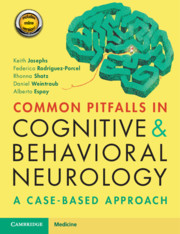Book contents
- Common Pitfalls in Cognitive and Behavioral Neurology
- Common Pitfalls in Cognitive and Behavioral Neurology
- Copyright page
- Dedication
- Contents
- Diseases Discussed in the Book
- Preface
- Acknowledgements
- Abbreviations
- Part 1 Missing the Diagnosis Altogether
- Part 2 Misidentifying the Impaired Cognitive Domain
- Part 3 Missing Important Clues in the History
- Part 4 Failure of Pattern Recognition
- Case 16 Too Many Behavioral Problems for Alzheimer Disease?
- Case 17 Look below the Surface (EEG)
- Case 18 “Too Young to Be Here”
- Case 19 Fluctuating Anxiety
- Case 20 Not Recognizing the Impostor
- Part 5 Difficult-to-Characterize Cognitive/Behavioral Disorders
- Part 6 Clinical Findings That Are Subtle
- Part 7 Misinterpreting Test Results
- Part 8 Attributing Findings to a Known or Suspected Disorder
- Part 9 Missing Radiographic Clues
- Part 10 Management Misadventures
- Index
- Plate Section (PDF Only)
- References
Case 20 - Not Recognizing the Impostor
from Part 4 - Failure of Pattern Recognition
Published online by Cambridge University Press: 03 November 2020
- Common Pitfalls in Cognitive and Behavioral Neurology
- Common Pitfalls in Cognitive and Behavioral Neurology
- Copyright page
- Dedication
- Contents
- Diseases Discussed in the Book
- Preface
- Acknowledgements
- Abbreviations
- Part 1 Missing the Diagnosis Altogether
- Part 2 Misidentifying the Impaired Cognitive Domain
- Part 3 Missing Important Clues in the History
- Part 4 Failure of Pattern Recognition
- Case 16 Too Many Behavioral Problems for Alzheimer Disease?
- Case 17 Look below the Surface (EEG)
- Case 18 “Too Young to Be Here”
- Case 19 Fluctuating Anxiety
- Case 20 Not Recognizing the Impostor
- Part 5 Difficult-to-Characterize Cognitive/Behavioral Disorders
- Part 6 Clinical Findings That Are Subtle
- Part 7 Misinterpreting Test Results
- Part 8 Attributing Findings to a Known or Suspected Disorder
- Part 9 Missing Radiographic Clues
- Part 10 Management Misadventures
- Index
- Plate Section (PDF Only)
- References
Summary
This 68-year-old right-handed woman was evaluated for parkinsonism. Over the prior nine months, she had progressively become more withdrawn from her husband, whom she had been married to for 45 years. Initially, she would intermittently startle when her husband came into the room. Later, she started to sleep in a separate bed and avoided changing her clothes in front of him. When her husband asked her if there was anything wrong, she avoided him without any explanation. She progressively became verbally and physically aggressive toward him, which led to an intervention by her children. When they asked her if there were interpersonal issues between her and their father, she reported that he was not her husband. She acknowledged the resemblance but insisted that he was actually an impostor. Her children’s attempts to prove her wrong only made her more agitated. She was taken to the emergency room, where, after ruling out infections, toxic exposures, and stroke, she was given diagnosis of a psychotic disorder and was started on an antipsychotic, risperidone 2 mg daily. While this helped with her agitation, she became slower in her thinking. Her level of attention would fluctuate, and sometimes it appeared as if she were in a daze. In addition, a bilateral hand tremor emerged, and she started to shuffle.
- Type
- Chapter
- Information
- Common Pitfalls in Cognitive and Behavioral NeurologyA Case-Based Approach, pp. 64 - 66Publisher: Cambridge University PressPrint publication year: 2020



